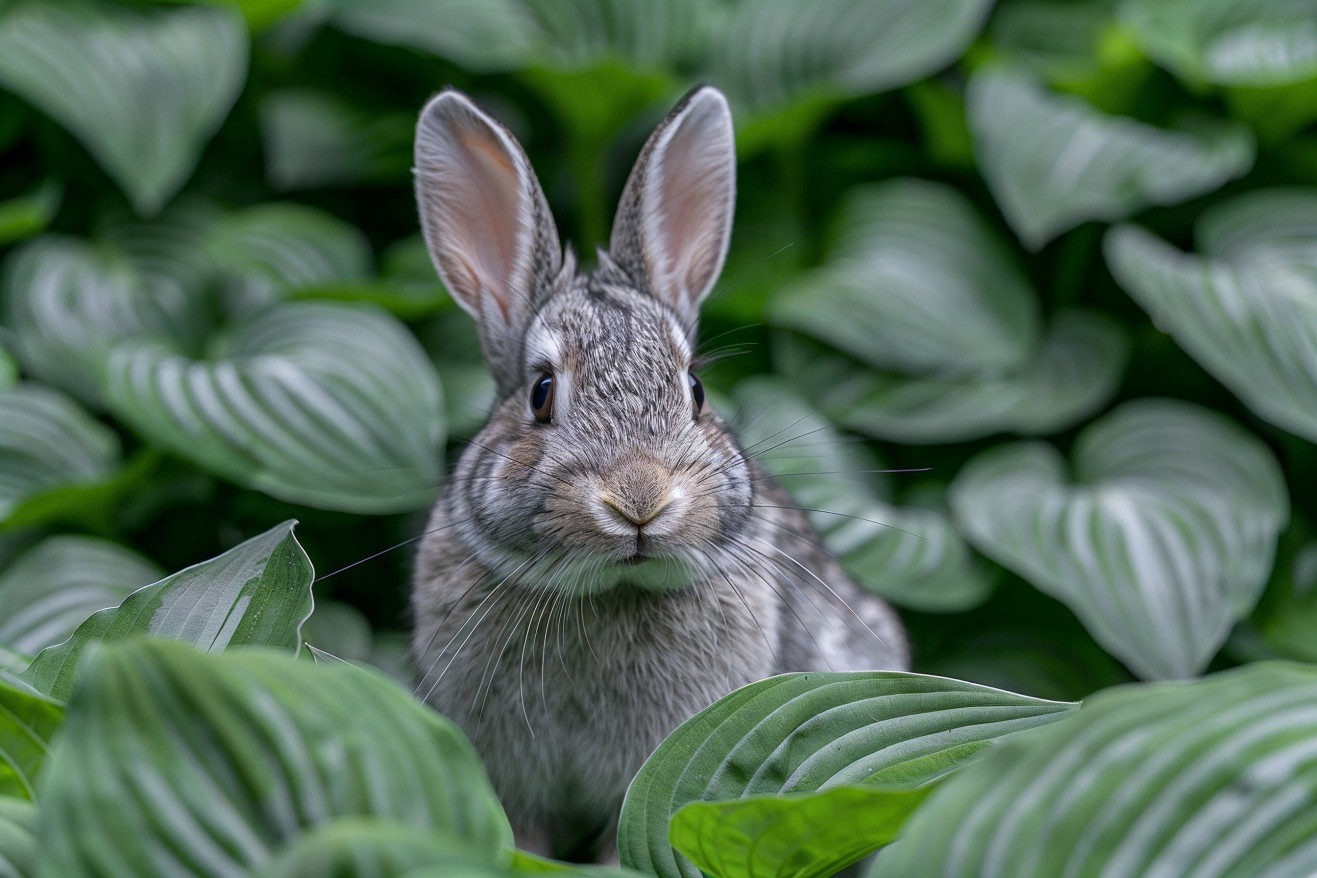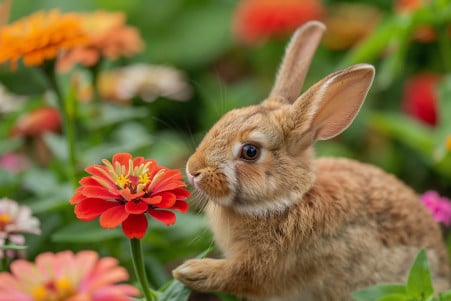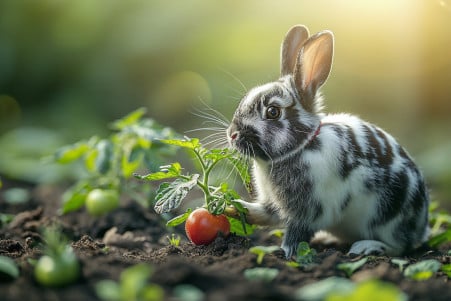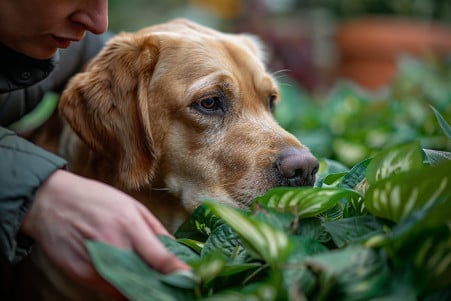How To Protect Hostas: Preventing Rabbits From Eating Your Plants
20 March 2024 • Updated 20 March 2024

Rabbits may be adorable and fluffy, but they love to eat plants like hostas, and that can be bad news for your garden. Rabbits are herbivores that eat a variety of grasses, vegetables, and leafy plants, and the broad leaves and succulent stems of hostas are especially tasty, meaning rabbits can quickly eat their way through a bed of hostas if they aren't protected.
As people who love rabbits and gardening search for ways to live in harmony with these cute little plant-eaters, we'll look at real-world solutions based on both wildlife management studies and gardening experience. We'll discuss how to keep rabbits from eating hostas by using methods like fencing, repellents, providing other food options, and even paying attention to rabbit behavior to stay one step ahead of them.
Do rabbits eat hostas?
Fencing: A Physical Barrier to Keep Rabbits Out
Creating a physical barrier is one of the most reliable ways to prevent rabbits from eating your hostas. Michigan State University Extension notes that low, fine-mesh fencing or chicken wire can be used to create a protective barrier around hostas. The fence should be at least 3 feet high to prevent rabbits from jumping over it, and it should be buried 2-3 inches deep to prevent rabbits from digging under it.
For individual plants, plant cages with 1-inch openings can be used to protect hostas from rabbits. These cages will keep rabbits away from the plants while still allowing for air circulation. Chicken wire and rabbit fencing that can be used to create these cages can be found at The Home Depot and other home improvement stores.
It’s important to make sure that the fencing is installed properly so that it can effectively keep rabbits away. This means that the fencing material should be securely attached to sturdy posts or stakes and that the bottom edge should be anchored with landscape pins to prevent rabbits from pushing it up and crawling underneath. In addition, fences should be checked regularly and repaired as needed to make sure that there aren’t any holes or other damage that could allow rabbits to get through. If these steps are taken, a physical barrier can be an effective way to keep rabbits from eating your hostas.
Repellents: Using Scents and Tastes to Keep Rabbits Away
In addition to physical barriers like fencing, gardeners can also use repellents to keep rabbits from eating their hostas. Bobbex explains that repellents work by using either smell or taste to make hostas undesirable to rabbits. Some common DIY repellents include rotten egg solutions, garlic sprays, and hot ingredients like tabasco or crushed red pepper.
For those who want a more turnkey option, Bobbex and Plantskydd both sell commercial repellents that are specifically made to keep rabbits and other small animals away from hostas. These products are made to be long-lasting and are safe for plants, people, and the environment.
No matter which repellent you choose, it's important to reapply it regularly, especially after it rains or when new plants are growing. The Weekend suggests using repellents in combination with other rabbit deterrents like fencing to make sure your hostas are as protected as possible. By using a variety of methods, gardeners can make sure rabbits stay away from their plants.
Companion Planting: Using Other Plants to Keep Rabbits Away
While physical barriers and chemical repellents can be effective ways to keep rabbits away from your hostas, companion planting is a more natural and aesthetically pleasing option. Proven Winners explains that certain plants can be planted around hostas to create a protective barrier that rabbits won’t want to cross.
Plants with strong scents, prickly leaves, and toxic properties are all things that rabbits tend to avoid. For example, The Spruce says that lavender, rosemary, alliums, and ornamental grasses are good choices for planting around hostas. This will help to confuse rabbits and keep them away from the hostas.
Epic Gardening also notes that hostas can be planted with Astilbe, Brunnera, and Bugleweed, which have different colors and textures that can help to deter rabbits. This will help to create a more natural, layered look while also adding another layer of protection against rabbits.
It’s important to note that companion planting is most effective when it’s used in conjunction with other methods like fencing and repellents. By using a variety of methods, you can make sure that your hostas are as protected as possible.
Hosta Types That Are Resistant to Rabbits and How to Grow Them
There are certain hosta varieties that are more resistant to rabbits than others. According to Michigan State University Extension, hostas with thick, leathery leaves and those with strong scents are less likely to be eaten by rabbits. Some of the hosta varieties that are resistant to rabbits include H. clausa, H. kikutti, and H. longipes.
The Weekend suggests planting these species, as they are more likely to survive in the warm climates where rabbits are more likely to be a problem. In addition, proper growing conditions, such as well-drained soil and raised beds, can help ensure that the hostas are healthy and better able to withstand rabbit damage.
When rabbit-resistant hosta varieties are used in combination with other rabbit deterrents like fencing and repellents, gardeners can ensure that their plants are as protected as possible. This multi-faceted approach is the most likely to be successful in keeping rabbits away and maintaining the beauty of a hosta garden.
Integrated Pest Management: A Holistic Solution
Integrated Pest Management (IPM) is the use of multiple techniques to manage pests in a way that is both effective and environmentally sensitive. This is a holistic way to manage rabbit pests in the garden. HGTV explains that IPM for rabbits can involve a variety of methods, including fencing, repellents, companion planting, and habitat modification.
In addition, encouraging natural predators, like owls and foxes, can help keep rabbit populations in check, according to Michigan State University Extension. As High Country Gardens notes, IPM requires ongoing monitoring and adjustments.
While this may seem like a lot of work, IPM is a sustainable and eco-friendly way to manage rabbit pests. By using a variety of deterrents and population management techniques, gardeners can keep their hostas safe while maintaining the overall health and harmony of their garden.
Conclusion: How to Keep Your Hostas Safe and Your Garden Intact
Rabbits may be adorable, but their taste for hostas can be a real problem for gardeners. As herbivores, rabbits eat a wide variety of grasses, vegetables, and leafy plants—and with their large leaves and succulent stems, hostas are a favorite food source that rabbits will eat to the ground if given the chance.
To deter rabbits from eating your hostas, the Extension suggests using rabbit repellents or sprays, and installing low, tight fences or chicken wire around beds or individual plants. They also recommend using baited traps, thinning crowded hosta plants, and spreading a thin layer of sand around your plants to deter slugs and snails.
According to The Weekend, the best way to force rabbits to change their dinner plans is to install a 3-foot-tall metal fence that rabbits can't jump over. They also suggest planting geraniums or marigolds, which rabbits don't like because of their strong odor, and making a rotten egg spray to keep rabbits away.
Better Homes & Gardens recommends using fencing, such as chicken wire or rabbit wire, to keep rabbits from eating plants in your garden. They also suggest anchoring the bottom of the fence to the ground. If fencing isn't an option, they recommend using a repellent spray that includes rotten eggs or garlic.


